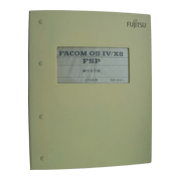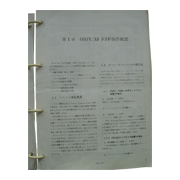OSIV/X8 FSP was an operating system (hereinafter “OS”) developed by significantly enhancing OSIV/X8 for Fujitsu’s FACOM M series medium-scale general-purpose computers, and was announced in February 1983.
As the use of information systems had rapidly expanding and the technology had been becoming more sophisticated, the demand below had been becoming stronger. The demand was to provide an architecture to meet end user-oriented systems such as OA (office automation) and FA (factory automation), which were required ease of use with focusing on operability, and to meet diversified communication forms caused by the open communication lines. In order to address this demand, Fujitsu developed OSIV/X8 FSP, which was based on OSIV/X8.
The following describes the features of OSIV/X8 FSP and functional enhancements of OSIV/X8 FSP:
OSIV/X8 FSP had the following features:
For OSIV/X8 FSP, Fujitsu provided support tools that enabled the end users to easily develop programs in order to meet the ever-growing demand for application program development.
With OISIV/X8 FSP, in order to achieve automation and labor-saving in system operation, the company formed a new storage hierarchy by adding the cartridge library device FACOM 6460 and consequently further enhanced the previous AOF (Advanced Operation Facility).
At that time, LANs were beginning to attract attention as the basis networks for office system building in response to the significant deregulation of limit of line use by the 2nd stage of opening communication lines. OSIV/X8 FSP therefore supported new local networks and global networks.
For OSIV/F4 FSP, Fujitsu enhanced its software products in order to shorten software development time and increase maintenance efficiency.
After OSIV/X8 was announced in February 1983, Fujitsu introduced functional enhancements of the OS and provided new software. The following table shows the major functional enhancements.
| Announcement date | Major features | Edition | Shipment date |
|---|---|---|---|
| February 1983 |
・Announced OSIV/X8 FSP, developed by substantially enhancing large general-purpose OS OSIV/X8.
-Support for JEFII, which integrated image and other multimedia processing -Provision of relational database AIM/RDB -Support for new networks Support for mission-critical LANs (optical data highway, digital switching system) |
E20 | October 1983 |
| March 1987 |
・Functional enhancements of OSIV/X8 FSP(common to OSIV/F4 MSP,OSIV/X8 FSP,OSIV/ESPIII)
-Support for multiple CPUs (4 CPUs) -Support for international standard OSI (OCSF) (*1) -Integrated network management COMS(*2) |
E20 | August 1987 |
| - |
・Functional enhancements of AIM V12 (common to OSIV/F4 MSP, OSIV/X8 FSP and OSIV/ESPIII)
-Support for presentation files (integration of screen editing processing between TSS/AIF and AIM, common function to the FACOM K series and the FACOM G series) -AP/EF(*3) and AP/DF(*4), which realized prototyping of simplified online and mission critical business applications -Integrated distribution support for slips: APS(*5) -High-level language COBOL 85, which supported a presentation file function COBOL85 ・Host-workstation linkage function LINKSERV
-DSM(*6),DRMS(*7),CJMS(*8),DTS(*9) |
E20 | July 1987 to March 1988 |
| June 1990 |
・Enhancements of OSIV/X8 FSP
-RDBII,FLCF(*10),TISP(*11),VTAM-G V30 |
E26 | November 1990 |
*2 COMS:Corporate Network Management System
*3 AP/EF:Application Program Environment/Execution Facility
*4 AP/DF:Application Program Environment/Development Facility
*5 APS:Advanced Printing Subsystem
*6 DSM:Distributed System Manager
*7 DRMS:Distributed Resource Management Support
*8 CJMS:Computer Network Job Management System
*9 DTS:Data Transfer Service
*10 FLCF:FNA Loose Coupling Facility (FNA:Fujitsu Network Architecture)
*11 TISP:TCP/IP Support Package



